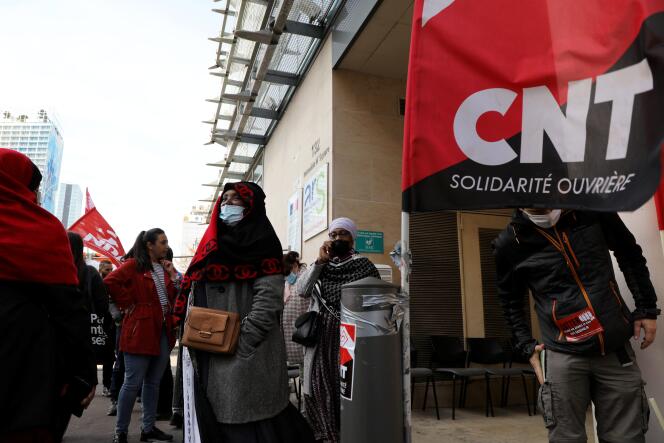
“Vacuuming, dusting, emptying the bins, cleaning the elevators, the toilets, wiping the mirrors… You have to be standing up or bending down all the time. I have pain in the shoulders, in the legs. » Fatima, 58, describes her daily life at Laser Propreté, which employs her two and a half hours a day to clean the premises of the regional health agency (ARS) Provence-Alpes-Côte d’Azur, in Marseille, for a salary of around 440 euros per month. Supported by the ARS unions, Fatima and her colleagues have been on strike since March 29, denouncing the work overload. A strike fund allows them to hold on.
hailed as “essential” for the continuity of economic and social life during the Covid-19 pandemic, workers in cleaning companies have not seen their working conditions improve. Part-time work, atypical and fragmented hours, low wages despite a 5.5% increase in branch minimums in 2022, or even hardship remain the lot of staff in this subcontracting, which has been developing since the 1970s. This sector, which has a turnover of 15.4 billion euros, employs 550,000 people in 14,000 companies, according to data for the year 2020 from the Federation of cleaning companies and associated services (FEP), employers’ organization representing 80% of the workforce.
Initiatives have been taken to improve the lot of these employees. On September 8, 2021, during a “progress conference” organized by the FEP, the latter called on public and private buyers to get out of the « culture low cost », and in particular to promote daytime and continuous work. “During the Covid 19 crisis, our customers demanded that our teams work partly during office hours, in order to reassure their own employees to return to work, observes Philippe Jouanny, president of the FEP. But it’s over. » The question of market prices is central, according to Christine Erhel, professor at the National Conservatory of Arts and Crafts and director of the Center for Employment and Labor Studies.
“Cost cutting”
“The downward pressure coming from the principals places a strong constraint on the companies”, notes the co-author of a report on the recognition of the professions of “second lines” (building, road transport, cleanliness, etc.) commissioned in 2020 by Elisabeth Borne, then Minister of Labour, and delivered in September 2021. The public sector is not exemplary, despite the recent circular, signed on March 16, by several ministers, including Mme Borne, in favor of responsible public procurement. “For two years, prices have fallen by 5.8%, calculates Mr. Jouanny. However, wages and social contributions represent 80% of the price. »
You have 56.55% of this article left to read. The following is for subscribers only.
–


